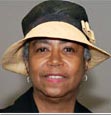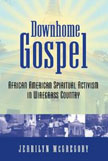 In her new book, Downhome Gospel:African American Spiritual Activism in Wiregrass Country (University Press of Mississippi, 2010), Jerrilyn McGregory returns to a Southern region and a Southern culture that she explored in her first book, Wiregrass Country (1997). Wiregrass country—which encompasses parts of southern Georgia, southeastern Alabama, and the Florida Panhandle—is a little-known region, with a history that "challenges long-standing assumptions about African-American life, history, and culture," McGregory writes in the introduction to her most recent publication. "Its inhabitants owe much of their love of sacred music to a dynamic historical past."
In her new book, Downhome Gospel:African American Spiritual Activism in Wiregrass Country (University Press of Mississippi, 2010), Jerrilyn McGregory returns to a Southern region and a Southern culture that she explored in her first book, Wiregrass Country (1997). Wiregrass country—which encompasses parts of southern Georgia, southeastern Alabama, and the Florida Panhandle—is a little-known region, with a history that "challenges long-standing assumptions about African-American life, history, and culture," McGregory writes in the introduction to her most recent publication. "Its inhabitants owe much of their love of sacred music to a dynamic historical past."
McGregory's first experiences with Wiregrass Country took place about fifteen years ago, and she writes in Downhome Gospel that she entered the area "tabula rasa… I was a neophyte in the South, a neophyte in Wiregrass Country, and a neophyte studying rural culture." McGregory made site visits and had chance meetings with the people of these often-overlooked communities. Wiregrass Country was the commencement of a spiritual journey for her, she writes, appreciating that the area's "folklife endures, and African Americans there expend much time, energy, and economic resources singing sacred music for the benefit of all who hearken to hear their sound." Because many of these traditions still go unnoticed and unappreciated, however, McGregory intends with Downhome Gospel to "close the gap by shining a spotlight on the downhome gospel in Wiregrass Country."
"Sacred music plays a magnanimous, stimulating, and scintillating role within people's everyday lives," McGregory writes. "In Wiregrass Country, the people often say, 'You don't have to sing like an angel.' For them, praising the glory of God in song does not require trained voices, but only the desire to display one's God-given talent, without reproach. African American Wiregrass sacred performance communities speak in song not just to God but to one another."
Despite a self-proclaimed unawareness of the region when she first began to visit the communities and started to connect with the residents, McGregory has received strong praise for the research she has done and the stories she shares in Downhome Gospel.
 "Jerrilyn McGregory… escorts her readers through their roads, homes, churches, and burial grounds, introducing us to the distinctive expressive culture that can be found throughout this region," writes Patricia A. Turner, author of Crafted Lives: Stories and Studies of African American Quilters. "Downhome Gospel is one of the richest and most significant ethnographic studies of an African-American community published in recent years."
"Jerrilyn McGregory… escorts her readers through their roads, homes, churches, and burial grounds, introducing us to the distinctive expressive culture that can be found throughout this region," writes Patricia A. Turner, author of Crafted Lives: Stories and Studies of African American Quilters. "Downhome Gospel is one of the richest and most significant ethnographic studies of an African-American community published in recent years."
In addition to cultural observations, McGregory writes about environmental setbacks that the area has suffered. Once rich in biodiversity, the area "stood for multiculturalism," McGregory writes. There are estimates that of an original 93 million acres of wiregrass, only 1 million acres remain. "Most people who live in the region have never seen it grow. Wiregrass is practically extinct along with certain species of wildlife, which could not survive within the monoculture deforestation produced.
"Yet, many of the region's human social rituals remain vibrant."
In addition to addressing that aspect of loss, McGregory writes in her epilogue that because of the length of time she devoted to her research, some of the people she interviewed passed away before the publication of Downhome Gospel. During this time, she writes, "my own son, Bill, succumbed. I could not have withstood his passing without years of tutelage by these spiritual activists.
"Over the years, I had not realized how much I had internalized their lyrics and absorbed their prayers."
McGregory's current research engages Boxing Day in the African Diaspora. Globally, celebrated on December 26, it is a long standing bank holiday for members of the British Commonwealth of Nations.
"Arguably, Boxing Day is one of the world's most celebrated yet under valorized transnational holidays," McGregory says. "'In total darkness' is one of the tropes I use to denote the holiday's basic obscurity. I privilege the festival arts as Boxing Day erupts in the Protestant New World, during the Yuletide season. Its visual signs privilege Gombey dancers in Bermuda, Junkanoo parades in The Bahamas, Jump Ups in St. Croix and J'overt in St. Kitts along with the traditional Moko Jumbies. An interrogation of how the Garifuna people of Belize and North Floridians celebrate on this day rounds out my ethnographic study."
